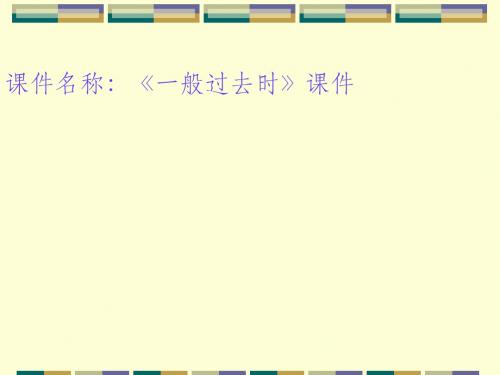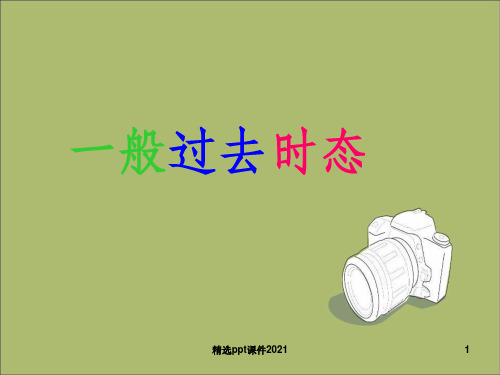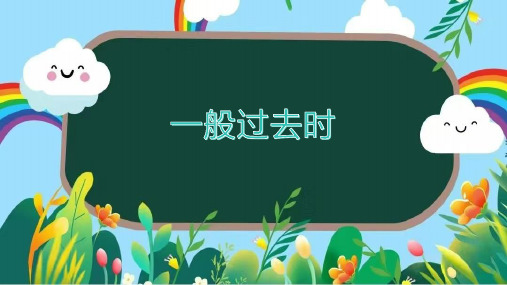初中英语语法一般过去式复习课件
合集下载
一般过去时(7张PPT)初中英语专项复习课件

易错点:
稿定PPT
(1)表示一系列的动作,尽管有先后,都稿用定一PP般T过,去海时量,素最材后持两续个动词之间用and连结。 He opened the door, rushed out and then disa更 总pp新 有ea, 一red上 款. 他千 适打款 合开模 你门板,选冲择了出去,然后就消失了。 (2)注意在语境中理解"我刚才/原来还不……"。
感谢观看
一般过去时 初中英语专项复习
一般过去时 构成:一般过去时用动词的过去式构成,其规则动词变化方法如下表所示:的状态。
情况 一般情况 以不发音的字母e结尾
以辅音字母 +y结尾
结尾只有一个辅音字母的重 读闭音节
构成方法
例词
加-ed
wash→washed help→helped
稿加定-PdPT
hope→hoped like→liked
一般过去时 (5)一般过去时有时可以表示现在,多与 want, hope, wonder, think, intend 等动词连用,使语气更委婉 。
I wondered if you could help me. 不知你能不能帮我一下。 有时用一般过去时也是时态一致的需要。 I didn’t know you were here. 我不知道你在这里。
He was here just now. 他刚才还在这里。 What did you do yesterday? 你昨天做了什么事?
(2)在过去一段时间内的经常性或习惯性稿动定作PP。T 稿定PPT,海量素材持续
We often played together when we were child更re新n.,我上们千小款时模候板常选在择一起玩。 总有一款适合你
一般过去时(12张PPT)初中英语专项复习课件

The Country mouse went to the house of the City mouse. It was a very good house. Nice food was set ready for them to eat. But just as they began to eat they heard a great noise. The City mouse cried, " Run! Run! The cat is coming!" They ran away quickly and hid.
一般过去时 初中英语专项分析
一般现在时 de 应用场景
过
动作行为
去
发
生
曾经
的
存在的状态
识别 标志词 理解 句意
答题技巧
熟练 动词 转换
yesterday last week 3 days ago
动词 过去式
熟练 句型 转换
肯定 否定 疑问
一般 过去时 He played basketball yesterday.
yesterday? Yes, I did. No, I didn’t.
动词 过去式 形态的变化
一般
直接加 ed
二般
以 e 结尾,去 e 加 ed live dance hope use
动词 过去式 形态的变化
三般
重读辅元辅,双写尾字母
stop plan
四般
辅音字母 + y 结尾,把 y 变 i 加 ed cry study worry
标志词
时间状语:last night, yesterday, the day before yesterday last week, some years ago in 1995, the other day, just now, in the past
一般过去时 初中英语专项分析
一般现在时 de 应用场景
过
动作行为
去
发
生
曾经
的
存在的状态
识别 标志词 理解 句意
答题技巧
熟练 动词 转换
yesterday last week 3 days ago
动词 过去式
熟练 句型 转换
肯定 否定 疑问
一般 过去时 He played basketball yesterday.
yesterday? Yes, I did. No, I didn’t.
动词 过去式 形态的变化
一般
直接加 ed
二般
以 e 结尾,去 e 加 ed live dance hope use
动词 过去式 形态的变化
三般
重读辅元辅,双写尾字母
stop plan
四般
辅音字母 + y 结尾,把 y 变 i 加 ed cry study worry
标志词
时间状语:last night, yesterday, the day before yesterday last week, some years ago in 1995, the other day, just now, in the past
八年级英语语法讲解-一般过去时精选教学PPT课件

Infinitive am is are begin break bring build buy can
不规则动词表
Past tense was were begun broke brought built bought could
Infinitive catch come do draw drink drive eat fall
或许,只有王林,只有他自己才知道,这个没有答案的答案吧。 这是耳根第一本真正意义上完结的作品,也是第一本仙侠,我总觉得,仙侠小说是没有结局的,我不喜欢写王林成为了宇宙苍穹第一人诸如此类的笑话。
我想写的是一个有血有肉的人,一个为了心中的逆,去一路逆天而走的男人。 修仙,没有尽头,所以我写了还有第四步,第五步,第六步,或许,还有更多,那是一条漫长的道路。 这正是代表了人的追求与执着,代表了一种理想的攀升与遥望,如前进的脚步,永生不会停止,会一直走下去。 仙逆,只是王林一生的一部分,是最早的一部分,在此后,他还会有更多的人生,只不过这部分人生,不是在书里体现,而是在我们的想象中畅游。
passed cooked 2、元浊 /d/ ,即 ed 在元音,浊辅音后面念 /d/ ,
例:borrowed enjoyed called moved
3、/t/ /d/ 之后念 /id/ , 即 ed 在 /t/ /d/ 音后面念 /id/ 例:wanted shouted needed counted
Past tense caught came did drew drank drove ate fell
用法 1、表示过去某个时间发生的动作或存在的状态。
He was here yesterday. I got up at six thirty yesterday morning. My father was at work yesterday afternoon. Did you have a good time last summer?
一般过去时.语法讲解ppt课件

精选ppt课件2021
一般过去时态
精选ppt课件2021
1
1. 含 义
一般过去时表示过去某个时间发生的 动作或存在的状态。常和表示过去的时 间连用。如last year,yesterday等. 我每天去上学。 我昨天去上学。 I went to school yesterday. 他每天下午都去打篮球。
他上星期一打篮球。
2.表示过去经常或反复发生的动作。
My father often went to work by bus last year.
When I was a child, I often listened to music.
精选ppt课件2021
3
3.表示已故人所做的事情。
Comrade Lei Feng did good deeds in his life.
精选ppt课件2021
2
2. 用 法
1.表示过去某个时间发生的动作或存在的状态。 He was here yesterday. I got up at six thirty yesterday morning. My father was at work yesterday afternoon. Did you have a good time last summer?
6.行为动词一般过去时的疑问式
一般过去时的一般疑问式在句首加助动词did Did+主语+动词原形……?
They f_in_i_sh_e_d_(finish) their work at four. 一般疑问句:
_D_i_d_ they _f_in_i_sh_ their work at four? Yes, they _d_id___. No, they _d_id_n_’_t.
一般过去时讲解课件(共19张PPT).ppt

否定句
1) 主语+wasn’t/weren’t+表语
He wasn’t a student ten years ago.
2) 主语+didn’t+动词原形+其他
They didn’t have a good time last night.
4.一般过去时的结构
一般疑问句
was为单数; were为复数
一般过去时的结构
4.一般过去时的结构
was为单数; were为复数
肯定句
1) 主语+was/were+表语
He was a student ten years ago.
2) 主语+动词过去式+其他
They had a good time last night.
4.一般过去时的结构
was为单数; were为复数
时间+ago类 in+年份类
yesterday morning;yesterday.... last night; last week...
two days ago in 2023
动词过去式的变化
3.动词过去式的变化 1.直接加ed work--worked look--looked 2.不发音的e结尾,去e加ed hope--hoped like--liked 3.重读的闭音节词,双协结尾字母加ed stop--stopped plan--planned 4.以辅音字母加y结尾,变y为i再加ed study--studied try--tried 5.不规则变化
What did they do last night?
总结与练习
5.总结与练习
一般过去时 1.定义:表示一个过去发生的动作或表示过去存在的状 态 2.标志词:yesterday,last...,....ago, just now..... 3.动词的过去式变化 4.一般过去时的各种句型:
一般过去时复习.ppt

stop — stopped
4.以辅音字母加y 结尾的词,先 改 y为 i,再加ed
study — studied
5.不规则变化.(见不规则动词表P142)
规则动词过去式-ed的发音
1.在以清辅音结尾的规则动词后,
-ed读作/ t / worked
/w3:k/t/
2.在以浊辅音或元音结尾的规则动词后,
A. write B. writed C. wrote
2. Everything __B_ ready before
Father came.
A. were B. was
C. is
3.He always __A___me last term(学期).
A. helped
B. helps C. help
4. —Tim ___B___ the math test last weekend. What about
I _d_id_n_’t__t_el_l _ them the news yesterday.
行为动词一般过去时的疑问式
一般过去时的一般疑问式在句 首加助动词did
Did+主语+动词原形……?
They f_i_ni_s_he_d_(finish) their work at four. 一般疑问句: _D_i_d_ they _f_in_i_sh_ their work at four? Yes, they _d_id___. No, they _d_i_d_n_’t.
1.与ago 连用:
two minutes
three hours
five days one week
ago
six months
four years
4.以辅音字母加y 结尾的词,先 改 y为 i,再加ed
study — studied
5.不规则变化.(见不规则动词表P142)
规则动词过去式-ed的发音
1.在以清辅音结尾的规则动词后,
-ed读作/ t / worked
/w3:k/t/
2.在以浊辅音或元音结尾的规则动词后,
A. write B. writed C. wrote
2. Everything __B_ ready before
Father came.
A. were B. was
C. is
3.He always __A___me last term(学期).
A. helped
B. helps C. help
4. —Tim ___B___ the math test last weekend. What about
I _d_id_n_’t__t_el_l _ them the news yesterday.
行为动词一般过去时的疑问式
一般过去时的一般疑问式在句 首加助动词did
Did+主语+动词原形……?
They f_i_ni_s_he_d_(finish) their work at four. 一般疑问句: _D_i_d_ they _f_in_i_sh_ their work at four? Yes, they _d_id___. No, they _d_i_d_n_’t.
1.与ago 连用:
two minutes
three hours
five days one week
ago
six months
four years
初中英语一般过去时复习课件

I fly kites seven years ago. I flew kites seven years ago.
Practice Oral Practice
Did you saw him just now? Did you see him just now? Tom wasn’t watch TV last night. Tom didn't watch TV last night. I didn’t my homework yesterday. I didn't do my homework yesterday. He wait for you two hours ago. He waited for you two hours ago. Who find the book just now? Who found the book just now?
Practice Oral Practice
说出正确的过去式变化,并朗读。
( B ) blow (B ) take ( B ) see ( A ) want
( B ) go
A. blowed A. taked A. seed A. wanted A. goed
B. blew B. took B. saw B. wants B. went
enjoy
enjoyed
make
ห้องสมุดไป่ตู้
visit see read
visited saw read
take dance open
dig close walk
dug closed walked
skate play study
made took danced opened skated played studied
Practice Oral Practice
Did you saw him just now? Did you see him just now? Tom wasn’t watch TV last night. Tom didn't watch TV last night. I didn’t my homework yesterday. I didn't do my homework yesterday. He wait for you two hours ago. He waited for you two hours ago. Who find the book just now? Who found the book just now?
Practice Oral Practice
说出正确的过去式变化,并朗读。
( B ) blow (B ) take ( B ) see ( A ) want
( B ) go
A. blowed A. taked A. seed A. wanted A. goed
B. blew B. took B. saw B. wants B. went
enjoy
enjoyed
make
ห้องสมุดไป่ตู้
visit see read
visited saw read
take dance open
dig close walk
dug closed walked
skate play study
made took danced opened skated played studied
初中英语语法复习课件:一般过去时 (共60张PPT)

—Were Wei Hua and Han Mei here just now﹖ Yes,they were / No,they weren't
练习:
( )1. My father______ill yesterday.
A.isn't B. aren't C. wasn't D. weren't
( )2. ______your parents at home last week﹖
一般过去时的时间状语(即标志词) 1. yesterday或以其构成的短语:yesterday morning(afternoon,
evening)等;
2.由“last+一时间名词”构成的短语:last night, last year (winter, month, week)等;
3.由“时间段+ago”构成的短语:a moment ago, a short time ago, an hour ago等;
Did the man cook breakfast this morning? Yes, he did.
What _____the boy _____ after school yesterday ? He______________.
What did the boy do after school yesterday ? He played football
A.are; were B. were; are C. was; are D. were; was
( )4. ______your father at work the day yesterday(前天)﹖
A. Was; before B. Is; before
练习:
( )1. My father______ill yesterday.
A.isn't B. aren't C. wasn't D. weren't
( )2. ______your parents at home last week﹖
一般过去时的时间状语(即标志词) 1. yesterday或以其构成的短语:yesterday morning(afternoon,
evening)等;
2.由“last+一时间名词”构成的短语:last night, last year (winter, month, week)等;
3.由“时间段+ago”构成的短语:a moment ago, a short time ago, an hour ago等;
Did the man cook breakfast this morning? Yes, he did.
What _____the boy _____ after school yesterday ? He______________.
What did the boy do after school yesterday ? He played football
A.are; were B. were; are C. was; are D. were; was
( )4. ______your father at work the day yesterday(前天)﹖
A. Was; before B. Is; before
- 1、下载文档前请自行甄别文档内容的完整性,平台不提供额外的编辑、内容补充、找答案等附加服务。
- 2、"仅部分预览"的文档,不可在线预览部分如存在完整性等问题,可反馈申请退款(可完整预览的文档不适用该条件!)。
- 3、如文档侵犯您的权益,请联系客服反馈,我们会尽快为您处理(人工客服工作时间:9:00-18:30)。
Summary 小结
一般过去时
周杰伦现在36岁。 Jay Chou__is_ 36 years old now.
周杰伦2004年26岁。 Jay Chou_w_a_s_ 26 years old in 2004.
我今年12岁。 I __a_m____ twelve years old this year.
我去年11岁。 I __w_a_s____ eleven years old last year.
由以上例句可知,含有实意动词的一般过去时 didn’t
的句子,变否定句时是在谓语动词前加———— ,同时谓语动词还原为—原—形——:变一般疑问句 时要借助助动词——did——,并将其放在—句—首——
,而且将谓语动词还原为原形。
其肯定回答为:Yes,主语+did.
否定回答为:No,主语+didn’t.
4. Do Li Ming study English this morning?
Exercises
Writing Practice
My parents 1___w_e_r_e___ (be) very busy last weekend. My mother 2___g_o_t____ (get) up very
1.含be 动词的一般过去时的句式结构: 1) 肯定句:主语+be(was/were)+表语(n., adj.等) They were in the classroom. 2) 否定句:主语+be(was/were)+ not+表语 They weren’t in the classroom.
一般在动词原形末尾加ed 结尾是 e 的动词加 d
请快速说出下列各词的过去式
Group Three
Group Four
1 shop---- shopped
1 try----- tried
2.plan--- planned 3.stop-- stopped
2 cry---- cried 3 carry--- carried 4 worry--- worried
2. I went to school yesterday.
3He often _d_o_eshis homework at his friend’s home. 4.He ___d_id_ his homework at school yesterday.
He plays basketball every day.
9. Jim usually __re_a_d_s__ (read) newspapers in the evening. Look! He _is__re_a_d_i_n_g(read) newspapers now. But yesterday he d_id_n_’_t_r_e_a_d(not read) newspapers. What did he do? He _w_a_t_c_h_e_d_ (watch) TV. He _w_e_n_t__ (go) to bed very late, so this morning he _c_a_m_e_ (come) late for school.
变成过去时 I had an iphone yesterday. You had an iphone yesterday. He had an iphone yesterday.
实意动词的一般过去时中没有人称和 数的变化
动词过去式口诀
一般过去时并不难,表示过去动作和状态记心间。 动词要用过去式,时间状语句末站。 否定句很简单,didn't 站在动词原形前,其它
He played basketball yesterday.
play played go
do/does did
went
肯定句:He went to the park yesterday. 否定句:He did not go to the park yesterday.
didn’t 一般疑问句:Did he go to the park yesterday? 答语:Yes, he did. / No,he didn’t. 特殊疑问句:Where did he go yesterday?
我们现在在教室。 We _a_r_e_ in the classroom now.
我们昨天晚上在家里。 We _w_e_r_e at home last night.
am / is
was are were
肯定句:We were at home last night.
否定句:We were not at home last night.
Liu Jie got up at 7: 10 this morning. He was a student three years ago. 2.表示过去经常或反复发生的动作。
Zhang Ya always went to school by bike last term.
谓语动词的构成形式
一般过去时的谓语动词有be动词 和行为动词两种基本形式
法宝之二:
动词过去式
规则变化 不规则变化
请快速说出下列各词的过去式
Group One
Group Two
1 play------ played 1 hope---- hoped 2 look---- looked 2 live--- lived 3 work----- worked 3 like--- liked 4 visit---- visited 4 use--- used 5 watch--- watched 5 dance--- danced
early, and she cooked breakfast for us. Then she
went to the supermarket 3_t_o_b__u_y____ (buy) some fruit. As for my father, he 4_h__a_d____ (have) lots of things to do. First, he 5_w__a_s_h_e_d__ (wash) his car. Next, he 6_p__la_y__e_d__ (play) tennis with his friend. Then he 7__s_a_w____ (see)
3) 一般疑问句:Was/Were+主语+表语? Were they in the classroom? Yes, they were./No, they weren’t.
4)特殊疑问句:疑问词+was/were+主语? Where were they ?
1. I go to school every day.
weren’t 一般疑问句:Were you at home last night? 答语:Yes, we were. / No, we weren’t. 特殊疑问句:Where were you last night?
肯定句:It was very hot yesterday. 否定句:It was not very hot yesterday.
—What a pity! A. leaves B. is leaving C. has left D. left 7. 去年我在大连遇见了她。
I met her in Dalian last year.
8. 昨天我妈妈去公园了。
My mother went to the park yesterday.
a movie with me on TV.
5. —What did you do on May Day?
—I __C___ shopping with my family.
A. go B. am going C. went D. will go
6. —I’m sorry the bus __D____ five minutes ago.
wasn’t
一般疑问句:Was it very hot yesterday? 答语:Yes, it was./ No, it wasn’t. 特殊疑问句How was the weather yesterday? =What was the weather like yesterday?
由以上例子可知,含有be动词was/were的 一般过去时的句子,变否定句时是在 was/were后面加not,可缩写为__w_a_sn_’_t/_w_e_r_e_n’_t ;变一般疑问句时是把was/were 提至—主—语—前———, 其肯定回答为:Yes,主语+was/were; 否定回答为: No,主语+wasn’t/weren’t.
be动词和行为动词两种基本形式
be动词(或系动词be)的过去式为was 和were两个。
行为动词的过去式,其变化分 为规则和不规则的两种。
两大法宝: 1.时间状语 2.动词过去式
法宝之一: 时间状语(火眼金睛)
yesterday yesterday morning one day last year two days ago in 1999 just now
1. 确定特殊疑问词
When
2. 助动词提前 did you have an iphone?
3. 组合
When did you have an iphone?
Practice 判断正误
Li Ming studied English this morning. (变 为一般疑问句) 1. Did Li Ming studied English thismorning? 2. Does Li Ming studied English this morning? 3. Did Li Ming study English this morning?
